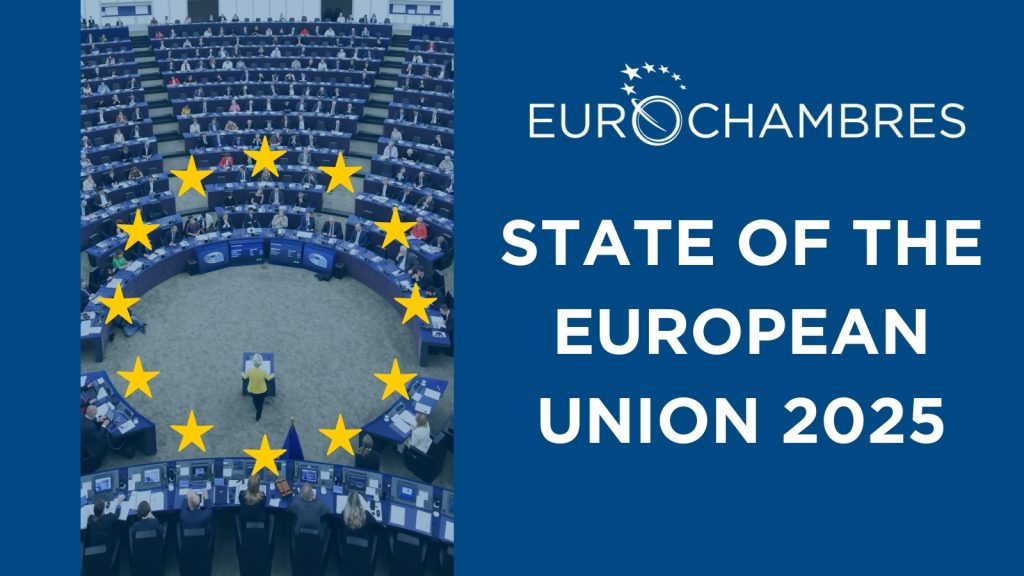State of the European Union 2025: Europe must control the controllables to revive competitiveness
As President von der Leyen prepares to make her annual State of the European Union (SOTEU) address to the European Parliament on 10 September, Europe finds itself in an extremely fragile economic situation. Transatlantic relations are strained and unpredictable, while several key EU trade agreements remain pending. Europe’s share of global output is shrinking as our growth rate plateaus and with this, our economic leverage is diminishing. Meanwhile, we continue to shoot ourselves in the foot by failing to address regulatory overkill and persistent barriers to trade within the single market.
In the runup to SOTEU 2025, it would be interesting to look back at the 2024 edition and consider progress. But there was no SOTEU in 2024, as the European Commission was halfway through a 6-month leadership vacuum following the spring European Parliament elections. This anachronistic and inefficient 5-yearly routine is somehow illustrative of the laborious procedures and decision-making that stifle Europe’s economic growth.
There was a strong and obvious argument for cautious, incremental progress at the start of the European project in the 1950s, as countries that were until recently at war with each other sought to rebuild the continent’s economy, as well as mutual trust. But this approach, or – to use terms more familiar to chambers – this business model is plainly not fit for purpose as we enter the second quarter of the 21st century. Nowhere is this more apparent than in relation to the single market.
Although there was no SOTEU last September, that month did of course mark the publication of the Draghi Report on European competitiveness. Professor Draghi highlighted the economically transformative potential of removing the many persistent non-tariff barriers to the free movement of goods, services, capital and people within the bloc. On paper, many of these cross-border obstacles no longer exist; in the marketplace, they very much do, as companies from across Europe regularly testify to the chamber network.
Chambers of commerce and industry certainly concur that the single market has the potential to generate considerable economic benefit and strengthen the EU’s hand on the international stage. But short-term, parochial and regrettably even protectionist attitudes prevail in some national capitals. This is markedly out of sync with the collective objective of the single market and indeed the dynamics of a global economy of complex, interconnected supply chains. Unfortunately, beyond platitudes in European Council conclusions, there remains little evidence that this is being redressed.
The 2019-2024 European Commission term was characterised by a surge in legislation, notably in the framework of the EU Green Deal. The current Commission, when it finally took office in December 2024, encouragingly expressed a strong commitment to simplify reporting requirements imposed on businesses, implicitly acknowledging the mistakes of the past. Initial efforts to streamline key sustainability rules through the first ‘omnibus’ proposal demonstrated that the Commission was determined to follow up on this commitment and co-legislators were quick to engage in the process too. However, Omnibus I is still under discussion in the European Parliament and subsequent simplification packages have been less substantive. Meanwhile, the European Commission is churning out new policy consultations and drafting significant new proposals at a frenetic pace, undermining the push for simplification. Frustration among entrepreneurs remains as they perceive no improvement. The early simplification momentum must be regained if businesses are to perceive a reduction in the regulatory burden and be able to divert resources to value-generating, job-creating activities.
There are many other areas where chambers call for progress and action. But if the European Commission – crucially with the support of the European Parliament and Council – can liberalise the single market and tackle the unmanageable stockpile of regulatory and reporting obligations while limiting the flow of new legislation, chambers believe that other elements will begin to fall into the place.
Competitiveness is again a buzz word around the streets and corridors of the quartier européen in Brussels. This is welcome, but hot air in the EU bubble will not expand the economy and ensure that Europe becomes a better place to start, expand and run a business. This buzz must be backed up with actions, starting with simplification and enabling market access. Chambers call on President von der Leyen to set the tone for this in her 10 September address and to ensure that it is then reflected in the actions of her college of commissioners and across the services. The Members of the European Parliament assembled in Strasbourg for SOTEU must also take responsibility, as must the 27 member state governments.
With external factors increasingly unpredictable, Europe must control the controllables to maximise its economic potential.
Ben Butters, Eurochambres CEO
